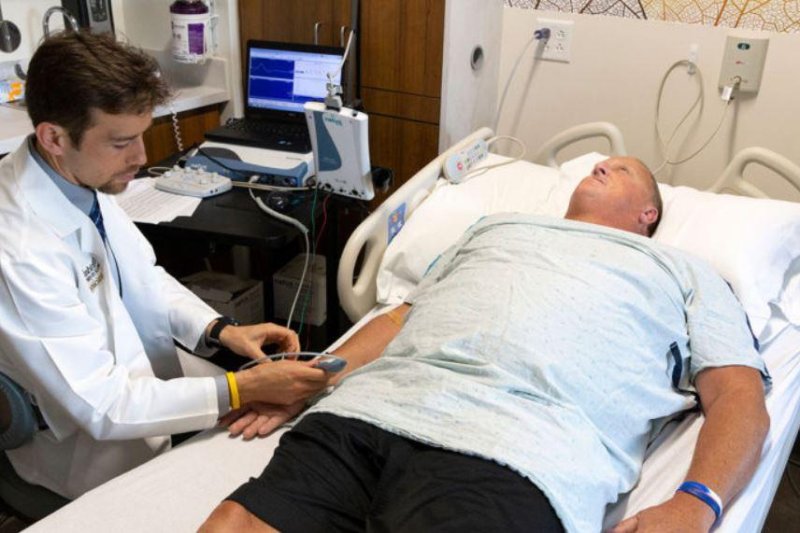Dr. Robert Bucelli, a neurologist affiliated with the Washington University School of Medicine in St. Louis, measures Gregory Easter's neuromuscular function. Easter, who has an inherited form of amytrophic lateral sclerosis, is taking part in a clinical trial to evaluate an experimental drug. Photo by
Mike Worful/Washington University
July 17 (UPI) -- A new therapy for an inherited form of amyotrophic lateral sclerosis, or ALS, extends survival and reverses signs of neuromuscular damage in mice and rats.
Washington University School of Medicine researchers have started clinical trials to find whether the drug can benefit people with ALS, also known as Lou Gehrig's disease. The findings were published Monday in the The Journal of Clinical Investigation.
ALS, which is caused by mutations in a gene called SOD1, is a disease that kills the nerve cells that control walking, eating and breathing. The survival rate is usually less than three years after diagnosis.
Of ALS cases, about 10 percent are inherited with a fifth of them caused by mutations in SOD1. The SOD1 protein becomes quite active and researchers believe cutting those protein levels might help ALS patients with SOD1 mutations.
"This drug had an impressive effect in mice and rats with just one or two doses," Dr. Timothy Miller, a professor of Neurology at Washington University, said in a press release. "We don't know yet if this works in people, but we're very hopeful. We've completed the first phase of safety testing, and now we're working on finding the right dose."
Currently, the U.S. Food and Drug Administration has approved two drugs for ALS, and they only slightly slow the disease's effects.
The Washington University researchers, in collaboration with Ionis Pharmaceuticals, tested DNA-based compounds that block the making of the SOD1 protein.
Two compounds were tested -- known as antisense oligonucleotides, or oligos -- in mice and rats.
An anti-SOD1 oligo or a placebo was given to mice at day 50, and a second dose about six weeks later. Among those receiving the active drug, they maintained their weight 26 days longer and lived 37 days longer than those given the placebo.
Rats that received an active oligo maintained their weight more than nine weeks longer and survived eight to nine weeks longer than those with the placebo.
Additionally, the oligos reversed some neuromuscular damage. Researchers treated 9-week-old mice with an anti-SOD1 oligo or a placebo. Over the next eight weeks, muscle function steadily improved in those that received the active drug, while it continued to decline in the placebo group.
Although a sign of neurological damage rose in both groups, it increased more than twice as quickly in the mice that received the placebo than the ones with the oligo.
In the human trials, the researchers are testing different doses and regimens without causing unacceptable side effects.
"The phase one/two trial is really still a safety trial," Miller said. "There are not enough patients in it to really be able to accurately see an effect on disease. But we're on the cusp of testing the hypothesis that people with ALS caused by mutations in SOD1 can benefit from this treatment. We predict the effect will be good, but we can't know until we test it."
Researchers plan to enroll 84 participants in the trial who are 18 and older through Feb. 2, 2019, to test the drug, called BIIB067, over 169 days.















